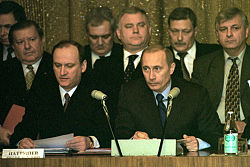
Counterintelligence state (sometimes also called intelligence state, securocracy or spookocracy) is a state where the state security service penetrates and permeates all societal institutions, including the military.[1][2][3][4][5][6][7] The term has been applied by historians and political commentators to the former Soviet Union, the former German Democratic Republic, Cuba after the 1959 revolution, Iraq under Saddam Hussein, China under the Chinese Communist Party (CCP), and post-Soviet Russia under Vladimir Putin, especially since 2012.
According to one definition, "The counterintelligence state is characterized by the presence of a large, elite force acting as a watchdog of a security defined as broadly that the state must maintain an enormous vigilance and enforcement apparatus... This apparatus is not accountable to the public and enjoys immense police powers... Whether the civilian government is able to control the security bodies is an open question; indeed the civilian government is so penetrated by the apparatus that there is no clear distinction between the two."[4]
In some cases, securocracies feature literal, direct rule of the state by officials originating from the secret police - as it was in the USSR under Lavrentiy Beria and Yuri Andropov, for instance, and as it is in Russia under Vladimir Putin.
- ^ John J. Dziak Chekisty: A History of the KGB (Lexington Books, D. C. Heath and Company, 125 Spring Street, Lexington, Mass.), with a foreword by Robert Conquest, pages 1–2.
- ^ Chekisty: A History of the KGB. – book reviews, National Review, March 4, 1988 by Chilton Williamson, Jr.
- ^ Richard H. Shultz, The Secret War Against Hanoi: The Untold Story of Spies, Saboteurs, and Covert Warriors in North Vietnam, – Page 356
- ^ a b Michael Waller Secret Empire: The KGB in Russia Today., Westview Press. Boulder, CO., 1994., ISBN 0-8133-2323-1, pages 13–15.
- ^ Overthrowing Saddam. How he rules., By James S. Robbins, a national-security analyst & NRO contributor, National Review, February 18, 2002
- ^ How New Are the New Communists? Oleksy Colloquium Reflects on the Legacy of the KGB by Dr. Michael Szporer
- ^ We must not cave in to the spookocracy in the Kremlin, by Martin Ivens, Sunday Times, January 20, 2008
